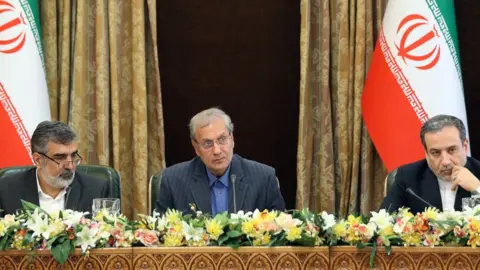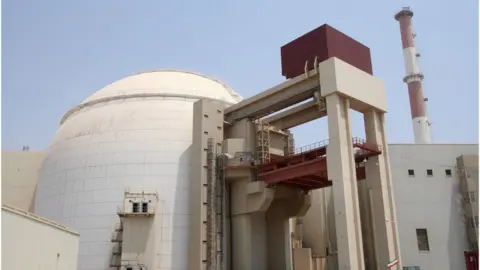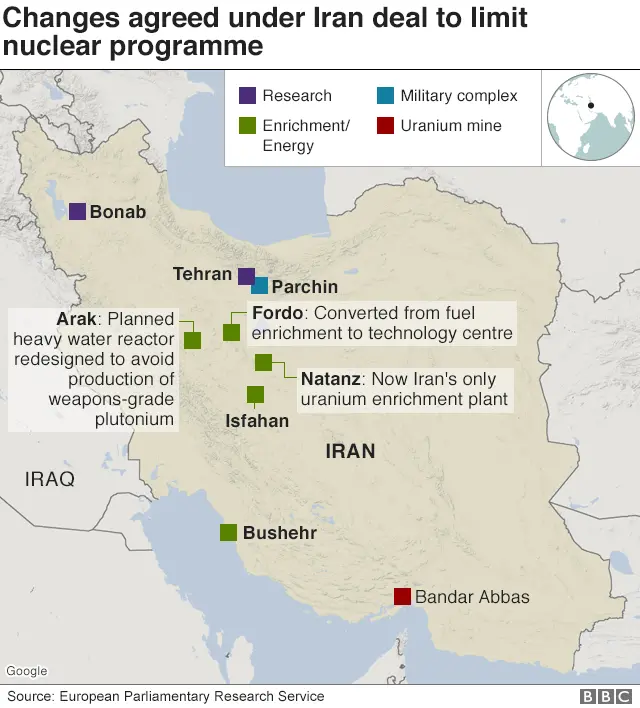Iran nuclear deal: Government announces enrichment breach
 EPA
EPAIran has announced it will break a limit set on uranium enrichment, in breach of the landmark 2015 deal designed to curb its nuclear ambitions.
Deputy Foreign Minister Abbas Araqchi said Iran still wanted to salvage the deal but blamed European countries for failing to live up to their own commitments.
The US unilaterally withdrew from the agreement in 2018.
It has since reimposed tight sanctions affecting the Iranian economy.
Responding to the latest announcement, US Secretary of State Mike Pompeo said it would only lead to "further isolation and sanctions" for the nation.
In May, Iran announced it would step up its production of enriched uranium, which can be used to make fuel for reactors but also for nuclear weapons.
The country has already stockpiled more enriched uranium than permitted under the terms of the deal.
Iran has strongly denied that it has any intention of building nuclear weapons.
What has Iran announced?
On the anniversary of the US withdrawal, Iran gave a 60-day deadline to the remaining parties to the deal - China, France, Germany, Russia and the UK - to protect it from US sanctions.
Speaking at a press conference on Sunday at the end of that deadline, Mr Araqchi said Iran would start enriching uranium above a concentration of 3.67% within a few hours.
 EPA
EPAOfficials previously said this would mean a concentration of about 5%. Iran's nuclear power plant in Bushehr requires "low-enriched" fuel at about this level.
Weapons-grade uranium is 90% enriched or more.
The ramped-up enrichment programme may be designed to exert pressure on the diplomatic negotiations, as Mr Araqchi said Iran would keep reducing its commitment to the 2015 deal every 60 days.
Another reactor in Tehran used for research purposes requires fuel enriched to 20% - the highest level Iran had been producing prior to the nuclear deal.
But a spokesman for the Atomic Energy Organisation of Iran, Behrouz Kamalvandi, said it already had a sufficient stockpile for that purpose.
"We will enrich uranium based on our needs," he said. "Right now, we don't need to enrich uranium for the Tehran reactor."
Foreign Minister Mohammad Javad Zarif stressed that the steps were "reversible" if European countries delivered on their commitments.
A spokesman for the global nuclear watchdog, the International Atomic Energy Agency (IAEA), said its inspectors would report back to headquarters "as soon as they verify the announced development".


The demise of the 2015 nuclear accord to contain Iran's nuclear programme seems to be coming ever closer.
Iran's policy of progressive breaches of the agreement's terms is seen in Tehran as a way to pressure the Europeans to relieve the impact of US economic sanctions.
But there is little they can do in practical terms to mitigate Iran's dire economic situation. The Europeans want the deal to survive but are caught between Tehran and Washington.
This has been a slow-motion diplomatic car crash - ever since the US walked out of the agreement a year ago.
French President Emmanuel Macron's telephone conversation with his Iranian counterpart on Saturday bought a little more time for consultations. The Europeans are struggling to postpone the moment when they have to declare the nuclear deal dead.
But at some point, if Iran continues to chip away at its limits and restrictions, they may have little choice.

What's been the reaction?
Mr Pompeo reacted on Twitter, reiterating US objections to the nuclear developments.
Allow Twitter content?
European powers said they had been conferring with each other to discuss next steps.
Germany said it was "extremely concerned" and urged Iran not to make any further moves to endanger the agreement.
A spokesman for the UK's Foreign Office said that while Iran had now broken the terms of the nuclear deal, the UK remained "fully committed" to it. The UK also called on Iran to stop its activities, and said it was co-ordinating with the other parties on what to do.
The announcement comes a day after French President Emmanuel Macron spoke to Iranian President Hassan Rouhani and expressed his "strong concern" about what would happen if the agreement was abandoned.
Mr Rouhani called on European countries to act now to save the deal.
Israeli Prime Minister Benjamin Netanyahu said the announcement was a "very, very dangerous step" for Iran, and repeated his calls for France, Germany and the UK to impose sanctions.
Israel's Energy Minister, Yuval Steinitz, had already criticised the move, saying that while the increase was "moderate", Iran had "begun its march... toward nuclear weaponry".
What is the nuclear deal?
Six countries signed the Joint Comprehensive Plan of Action (JCPOA) in 2015 to curb Iran's nuclear programme.
Tehran agreed to let in international inspectors and to limit its nuclear activities, in exchange for an end to tight economic sanctions.
Under the deal, Iran is only permitted to produce low-enriched uranium, which has a 3-4% concentration of U-235, and can be used to produce fuel for nuclear power plants.
The deal also restricted Iran to stockpiling no more than 300kg (661lb) of the low-enriched uranium.
According to the Arms Control Association, a stockpile of 1,050kg could be further enriched later into enough material to build one bomb.



